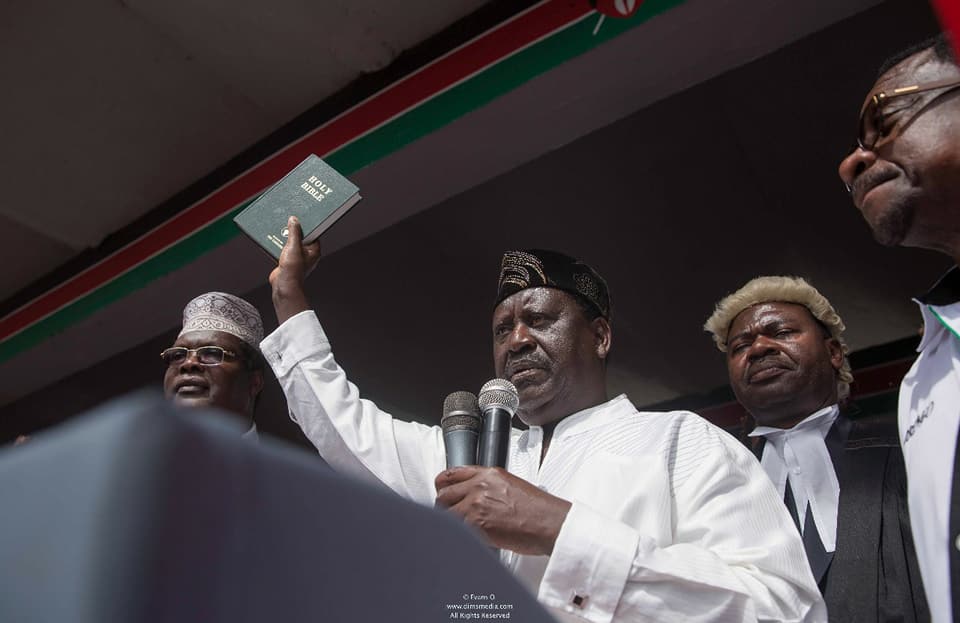Kenya government on spot over media, opposition crackdwon


By Fauxile Kibet
The Kenya government has come over increased pressure over its move to crackdown on a section of the Media and some top opposition leaders.
Kenya’s Communication Authority last week switched off three privately owned TV stations after the country’s Interior Minister Dr. Fred Matiangi accused the media stations of having taken part in attempts to “overthrow the legally constituted government” after it covered the swearing in of Opposition leader Raila Odinga.
Mr Odinga was sworn in as the “people’s president last week on Tuesday, a move that has also seen a section of the opposition leaders arrested.
On Monday, the government however switched on two of the stations but one remained shut down even as pressure mounts from foreign governments and human rights groups on the government to end what they termed as “dictatorship”.
United States Ambassador to Kenya Robert Godec termed Kenya’s actions as abuse of power and disregard for the rule of law.
“Free media and adherence to the constitution and the rule of law is essential to democracy. Court orders must also be respected,” said Godec.
Ambassador Godec’s sentiments came even as the government appeared to overrule court orders over the re-opening of TV stations and release of opposition leaders among them outspoken activist Miguna Miguna, who was later deported to Canada on grounds he had earlier renounced his Kenyan citizenship.
The government has since re-opened two stations by one, Citizen TV and its sister channel Inooro still remain shut.
Fourteen politicians were also on Monday warned that they risked their passports being revoked over what the government termed as “criminal activities” which includes having aided Mr. Odinga’s “swearing in ceremony”.
On Tuesday morning, dozens of police officers were seen patrolling the streets of Nairobi and Milimani law courts where opposition leader Miguna Miguna was to be presented in court in person by Inspector of Police Joseph Boinnet and DCI boss George Kinoti.
The charges against Mr Miguna were however unclear as the state had not come clear on what charges would be preferred against the opposition leader.
RECORD STATEMENTS
At the same time, a number of opposition Members of Parliament were expected to record statements for allegedly attending Mr Odinga’s swearing in Ceremony at Uhuru Park last Tuesday.
The Government had declared the event illegal and that it amounted to treason. The government has also revoked fire arm licenses belonging to the legislators but the MPs have sued the state for failing to provide them with security
President Kenyatta’s re-election was overturned by the Supreme Court over what it termed as “illegalities and irregularities”, but Mr. Odinga boycotted a re-run over claims that necessary reforms had not been instituted.
Mr Odinga’s National Super Alliance party consequently stated that they would not recognize Mr Kenyatta’s win and that they would hold a parallel swearing in ceremony – claiming that Mr. Odinga was the legitimately elected president.
Police however arrested an Opposition Member of Parliament and lawyer Tom Kajwang who oversaw Mr. Odinga’s swearing in which had been outlawed by government. But Mr K’ajwang while speaking to journalists stated that his actions were constitutional and that he feared no arrest.
“There is no issue of treason to the person who administers the oath or the persons who takes it,” Mr Kajwang told journalists in Nairobi.
Analysts however argue that Mr. Odinga’s choice of words – by using “The People’s President” instead of “The President of the Republic of Kenya” was used to avoid any charges of treason.
Mr. Kajwang and three Journalists who had been also arrested were however released with no charges.